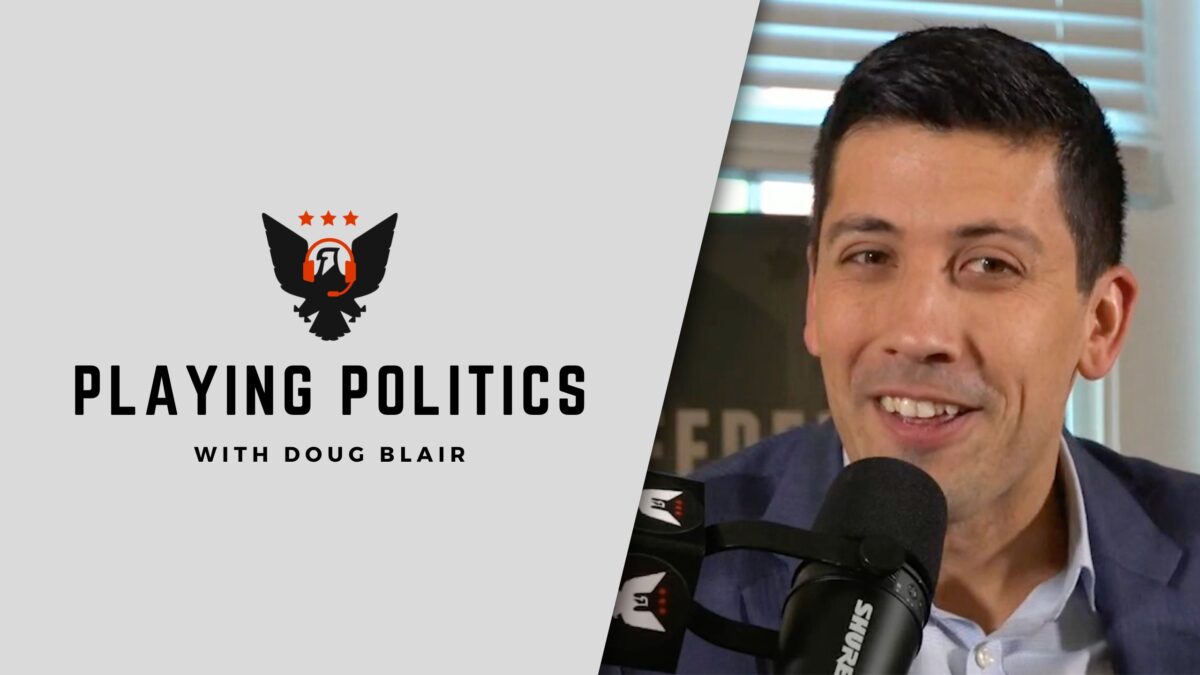
Feminist agitator and self-proclaimed video game critic Anita Sarkeesian has had a bad few weeks. Her most recent video, “Women as Reward,” attracted nowhere near the amount of fanfare previous outings did, her censorious comments regarding the “Doom” franchise got her roundly mocked, and now she’s at the center of the slow-motion train crash that is the United Nations Cyberviolence Report. Even her collaborator on said report, Zoe Quinn, has disowned it, while Sarkeesian has stayed suspiciously silent. All in all, it seems the old girl has lost a bit of her edge at attracting fawning press coverage for her supposed bravery and cogency.
That’s a victory for truth, at least, because Sarkeesian is neither brave nor cogent. Her “bravery” largely consists of telling off anonymous Twitter trolls and hyperventilating over specious bomb threats even after law enforcement has dismissed those threats. As for “cogency,” Sarkeesian’s videos are less arguments than extended logical fallacies. As I detailed in a previous lengthy series on this topic, Sarkeesian poisons the well so often that cholera bacteria would tell her to slow down, and she seems to think begging the question is an Olympic sport. That’s not even touching her numerous errors of fact and interpretation.
What Sarkeesian undeniably is good at, however, is stirring controversy. I have yet to encounter a single video-games enthusiast with a simply middling opinion of her work. One either regards her as a brilliant, lonely voice crying out in the misogynistic wilderness, or as an intellectually bankrupt mean girl trying to use fraudulent accusations of misogyny to destroy the cherished hobby of millions of gamers.
Anna Sarkeesian Isn’t Controversial—She’s Boring
Now, I think a lot of the Sarkeesian hate can be chalked up less to what she actually says than to her delivery and attitude. Unless you already agree with her, watching Sarkeesian’s videos is an ordeal, primarily because of her sour, humorless, schoolmarm-esque demeanor. It’s not surprising that at least one of her critics refers to her angrily as a “prom queen.” You’d be hard-pressed to find even the nastiest high-school Plastic talking about a subject with more obvious lip-curling contempt.
However, strip away Sarkeesian’s thinly veiled “um, eww, guh-roooossss” attitude, and the pervasive rage against her gets a bit harder to explain. Upon her words alone, Sarkeesian’s brand of feminism shouldn’t be controversial. In fact, quite the opposite: It’s terribly shallow and dull.
This soporific character of Sarkeesian’s corpus can best be seen contrasted with the work of previous famous feminists. Say what you like about feminism, but its most well-known exponents have always been brilliant at detailing some wasted potential or casual cruelty visited upon women by a sexist society, even if those sexist sins existed solely in their minds.
Love it or hate it, Betty Friedan’s “The Feminine Mystique” is undeniably a stirring polemic by a woman who felt trapped by the narrow limits imposed on her self-actualization. Germaine Greer’s “The Female Eunuch” seethes with its author’s moral outrage that her sex has been turned into a consumer good. Even Andrea Dworkin, horrific and hateful though her writing is, makes one acutely feel the pain of a rape victim trying desperately to regain her agency by lashing out in books like “Intercourse.” Yes, these women are all trading on grievance, but in all these cases (and others), it is grievance depicted in such vivid, lurid, and searing terms that their moral indignation becomes highly contagious.
Does Paying for Dinner Mark Entitlement?
So what grievance does Sarkeesian seek to highlight? Well, considering what she talks about most frequently in her videos, it seems to be the concept of “male entitlement.” Sarkeesian defines the term this way in her latest video:
By extension, ‘male entitlement’ is the conviction that men are owed something by virtue of their gender. It’s the belief structure that tells men they deserve to have their whims catered to, both culturally and interpersonally. One of the most harmful aspects of male entitlement is the false belief that men have a right to survey and use women’s bodies. This mentality carries with it a corresponding set of expectations about what women should provide for men. It’s a worldview that primarily defines women’s social role as vessels of sexuality, and men’s roles as consumers or patrons of that sexuality…
The male entitlement mindset has a profound impact on how men relate to and interact with women. We see it manifest whenever a man orders a woman to show him her ‘tits,’ or makes demands during an online game that a woman send him nude or sexual photos. We see it in real-world spaces whenever men catcall women on the street. We see it whenever a man gropes a woman at an event or convention. We see it whenever a man expects sex in return for buying a woman dinner. At its most serious, male entitlement is the mentality that serves as the foundation for the epidemics of date rape and sexual assault in our society.
Now, ignore that this hypothesis is totally unprovable, and instead consider what Sarkeesian cites as examples of this “male entitlement” worldview. First off, most can probably be more easily chalked up to immaturity and poorly controlled libido than anything as coherent as believing one has a right to the female body (an objection Sarkeesian tries to counter by claiming, again without the possibility of proof, that male entitlement operates as an invisible backdrop to human society). However, the last example—a man expecting sex for buying a woman dinner—is intriguing.
Granted, I’ve yet to encounter any man who expected sex after the first date, but certainly, in modern hookup culture, men who pay for women’s dinners expect that the prospect of a relationship (and by extension, sex) is on the table. Otherwise, there would be no reason for them to pay for the dinner in the first place. In other words, this is a two-way street. If you’re not willing to risk rejection, don’t ask a woman out, and if you’re not willing to give a man a shot, don’t say yes if he does ask you out.
This means that while a man who treats a date as a commitment to a relationship or sex is behaving immaturely, so is a woman who accepts dates knowing full well she has no intention of giving her suitors a chance. Leading someone on is at least as evil as pushing too hard.
Entitlement Means Wanting Your Part of an Exchange
But, you might say, Sarkeesian surely isn’t talking about men who behave well. Or is she? Here she is on how video games can contribute to “male entitlement”: “Players make the correct inputs into the game; a woman’s affection or her body is the corresponding output. Players go through the process of saving the princess, and the game’s algorithm dutifully rewards them with what they think they are rightfully owed for doing so: whether it be a kiss, a girlfriend, or sexual attention.”
Now this is a much harder line to take. Saying that anger over wasted money on a dinner is a case of entitlement is one thing. Saying that it’s only fair to offer some degree of affection—even just a single kiss—for being rescued from a life-threatening situation is a more defensible position. Granted, the heart wants what it wants, but what Sarkeesian seems to really be railing against is the idea that a lack of affection can be unjust in any situation. In other words, it’s an almost Randian rejection of reciprocity, where any and all heroic behavior undertaken with the hope of sex or affection becomes simply date rape by other means.
This is not merely a callous perspective, but also a terribly short-sighted one. After all, if heroism is recast as entitled hankering after sex, then the odds of men being willing to engage in heroic behavior for women they find attractive decrease substantially, if not altogether. What’s more, it’s morally problematic, because it places women in the position of being allowed to exploit men for their time, money, or even lives with a clean conscience.
The idea that they shouldn’t do this is precisely what Sarkeesian seems to find most objectionable, given her anti-chivalry broadsides in the “Damsel in Distress” series of videos, or her anger that the option to mistreat women is even programmed into games in the first place (regardless of whether the corresponding ability to hurt men is programmed in, as well). Taken together, these complaints show that Sarkeesian’s desired world is one where women face no expectations of any kind, nor any possible consequences for their choices.
Don’t Expect Anything From Women
In short, where previous generations of feminists from Freidan through Dworkin complained of women’s stifling lack of agency, Sarkeesian’s complaint is that people consider women to have moral agency at all. If a woman wants to lead a man on, Sarkeesian seems to say that’s her prerogative. If a woman wants to laugh in the face of a rescuer and call him a loser, Sarkeesian seems to say that’s her prerogative. No matter their actions (in video games, at least), women should be free from the threat of harm or consequences of any kind.
This isn’t feminism. It’s “a sucker born every minute” con artistry transformed into a moral vision. Given Sarkeesian’s own past as a scam artist, one can see where she’d find it attractive. However, her greatest ideological failure is not so much in her defective morality (to which much of feminism is no stranger), as in her conspicuous failure to sell it. If one is going to defend evil as liberation, one has to do it in a very compelling fashion. This Sarkeesian cannot do, for the passages quoted above are not stirring statements of moral outrage, nor are they philosophically dazzling feats of ethical sophistry.
Underneath Sarkeesian’s dry, freshman-year gender studies-style rhetoric is a stunningly banal, shallow pronouncement: Women can do no wrong, and if men expect anything of them, the sexist haters gonna hate. It is a sentiment that can only be uttered in its honest form by the White Girl Wasted residents of the nearest third-rate college bar, their infinity scarves askew and their Ugg Boots soaked in recently expelled vomit. It is the creed of the overprivileged and spoiled, who mistake boundaries for oppression, and reciprocity for slavery. It is petulant, childish, unsophisticated, and stupid.
But worst of all, like Anita Sarkeesian, it is sour, shallow, and desperately dull.









